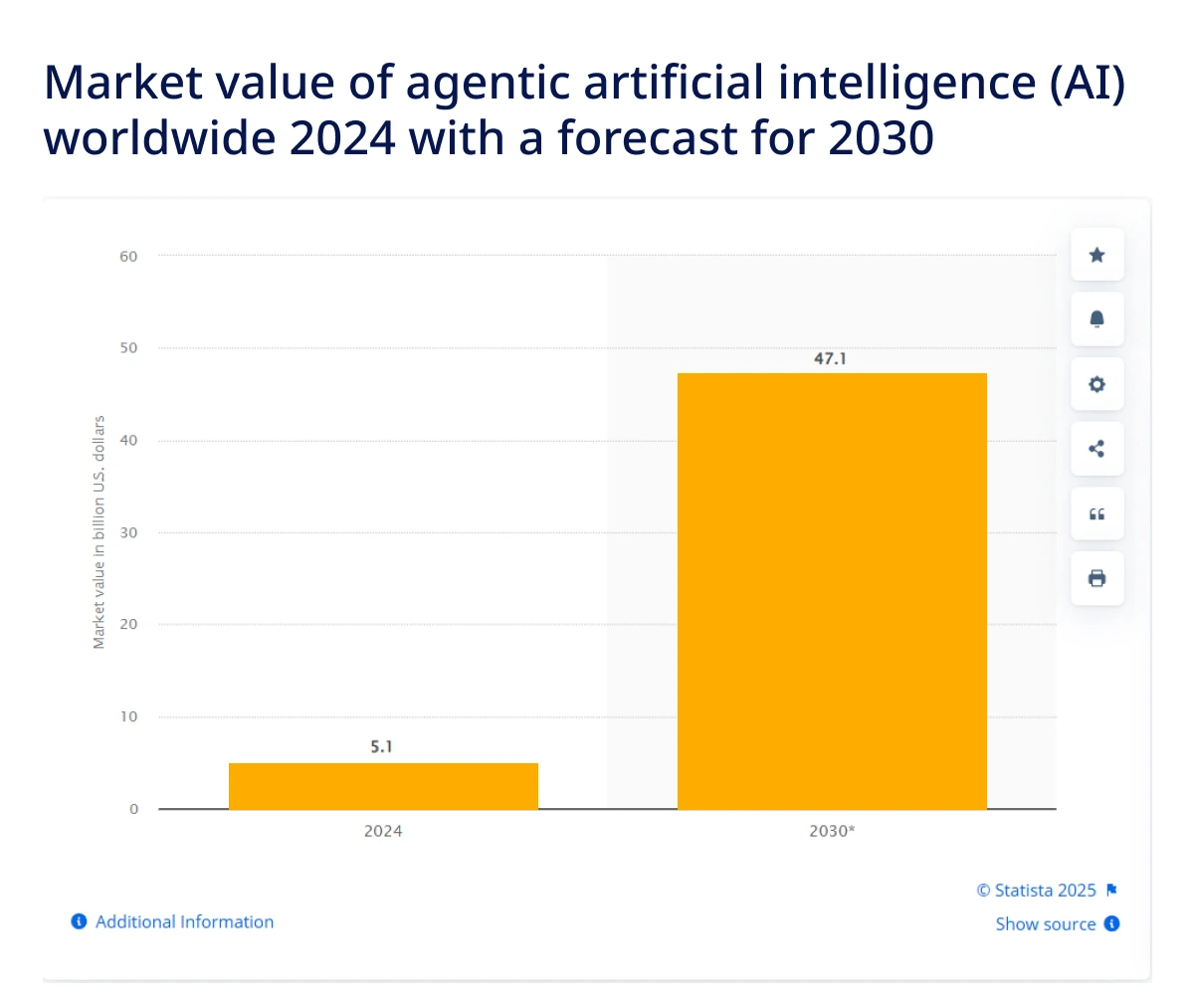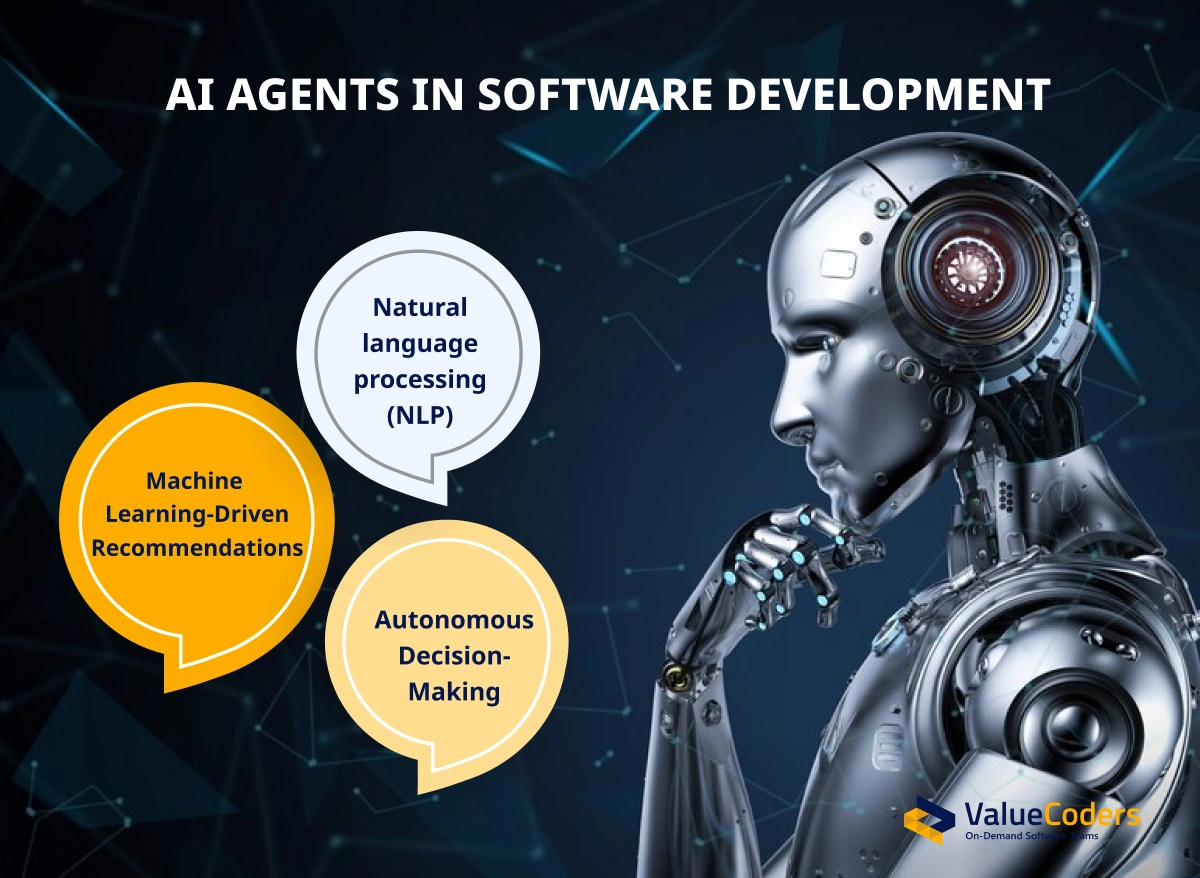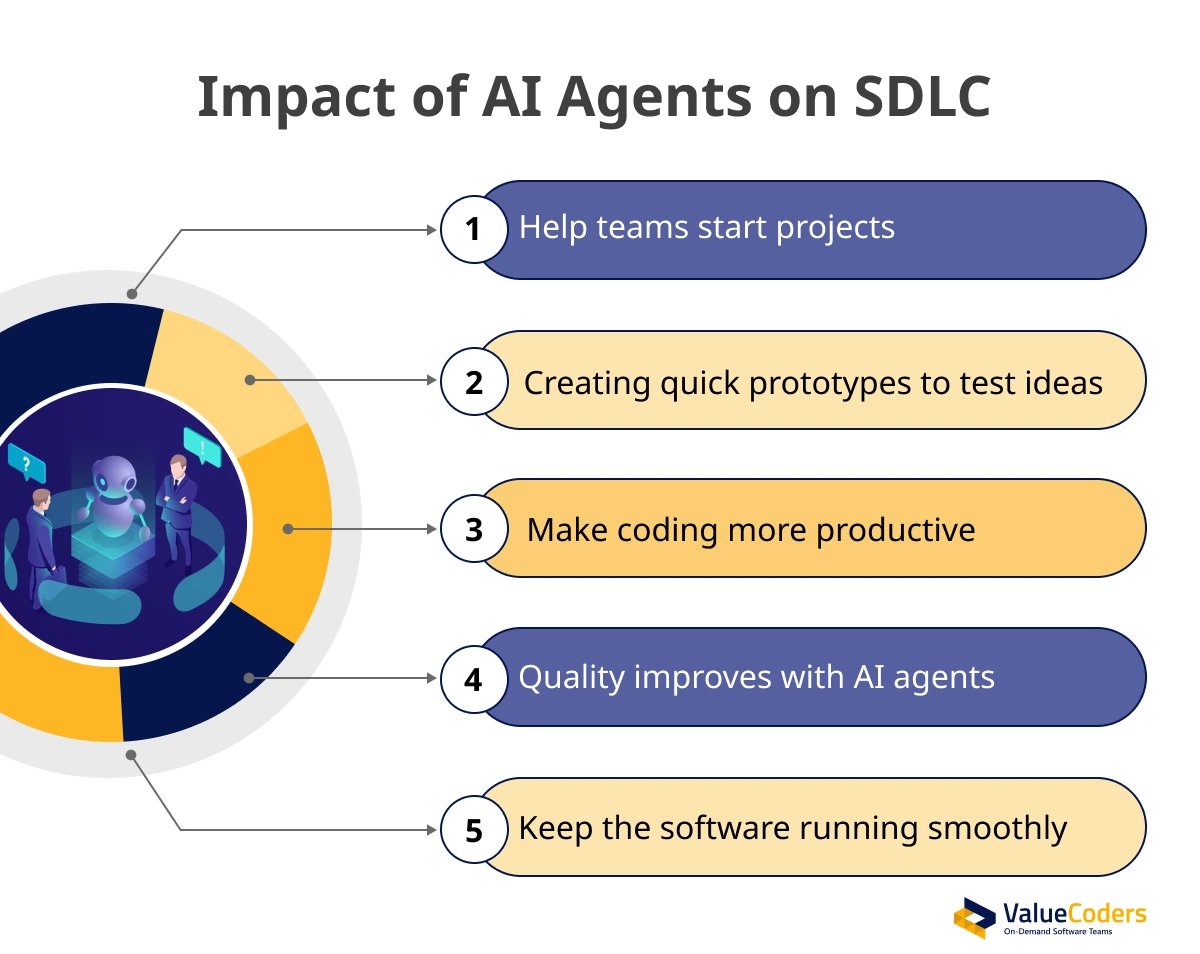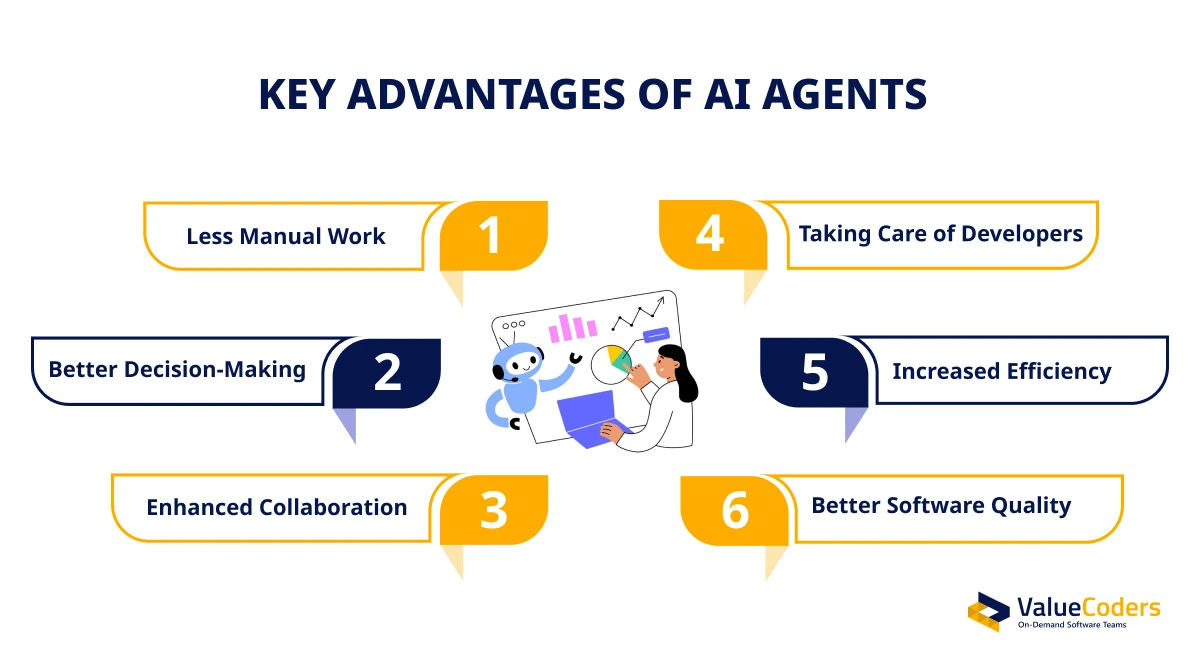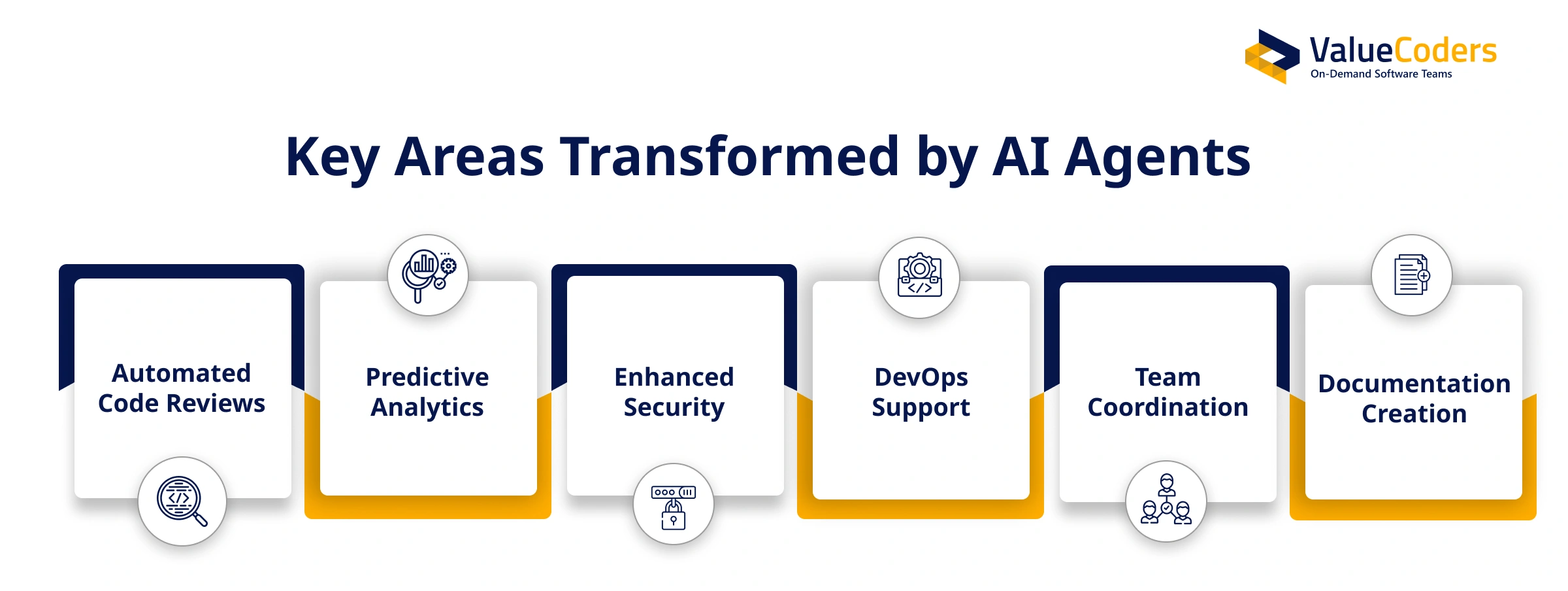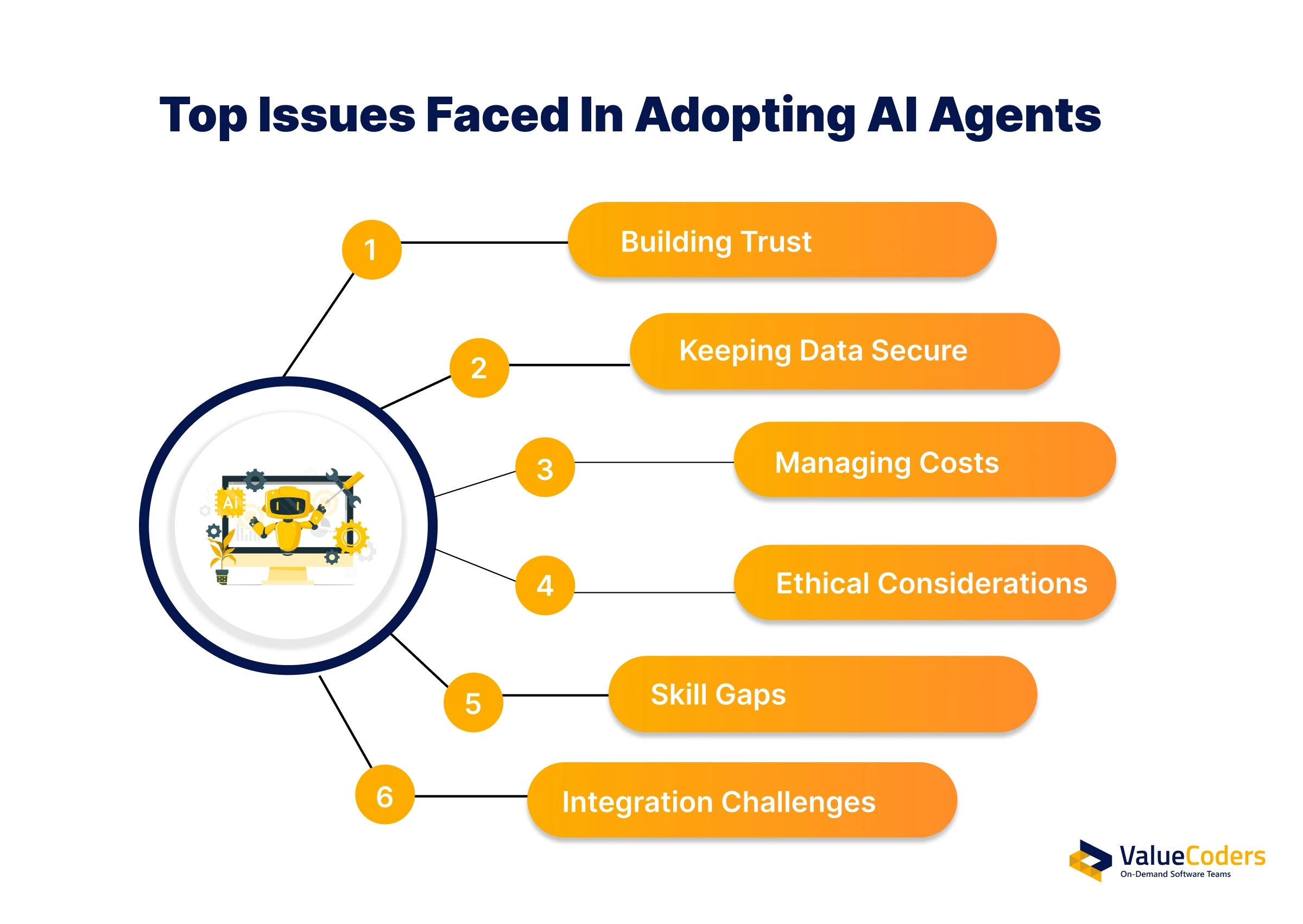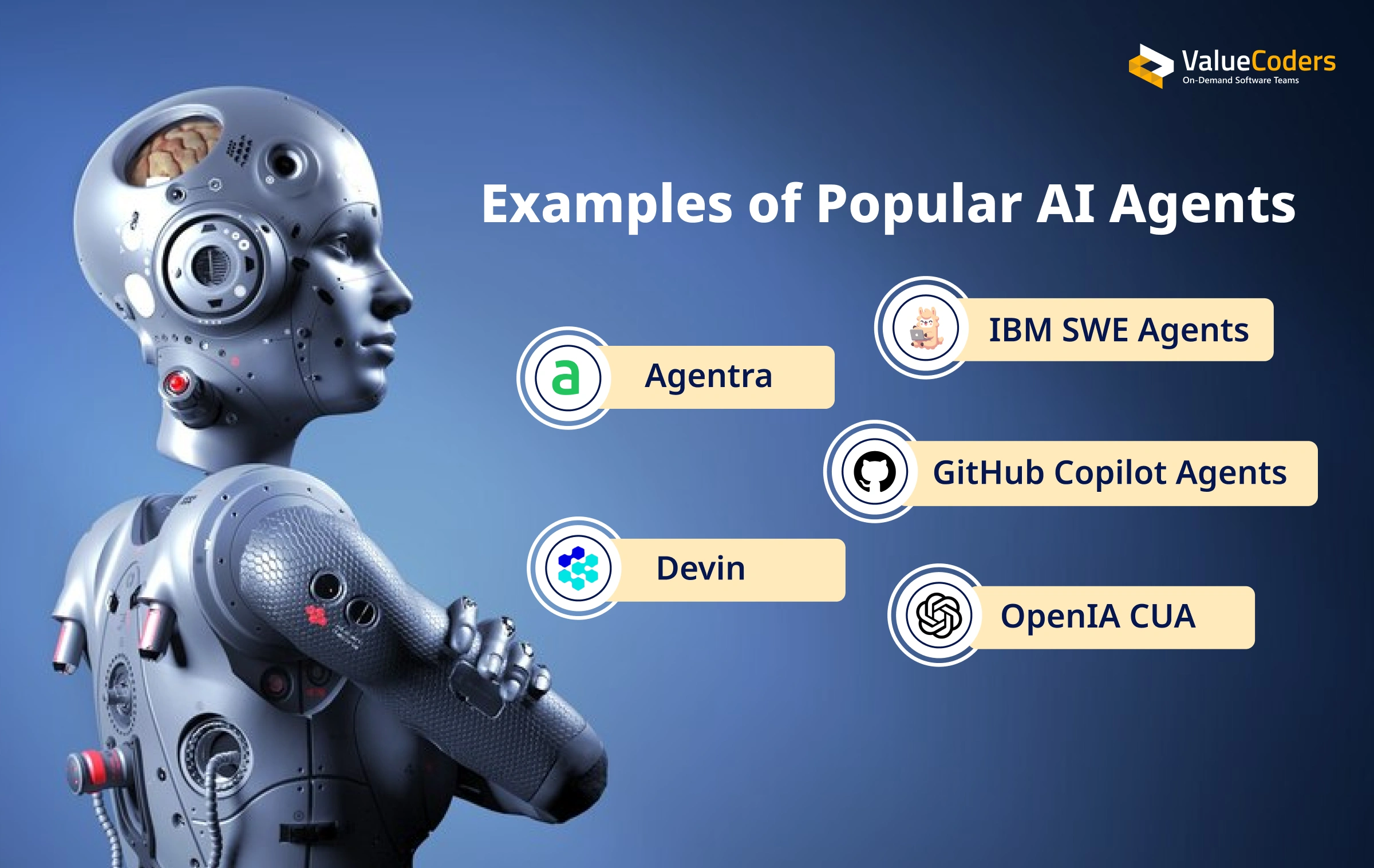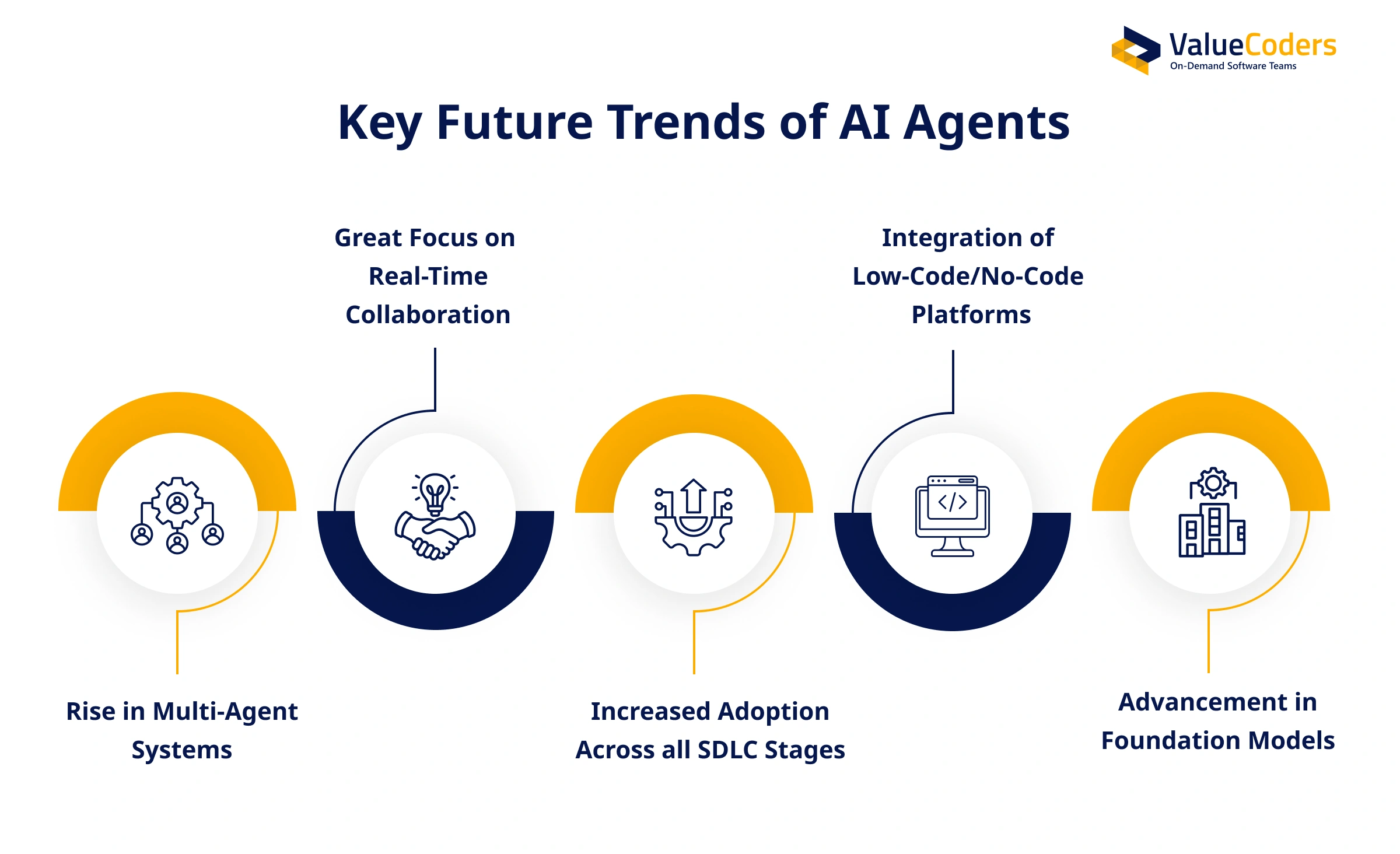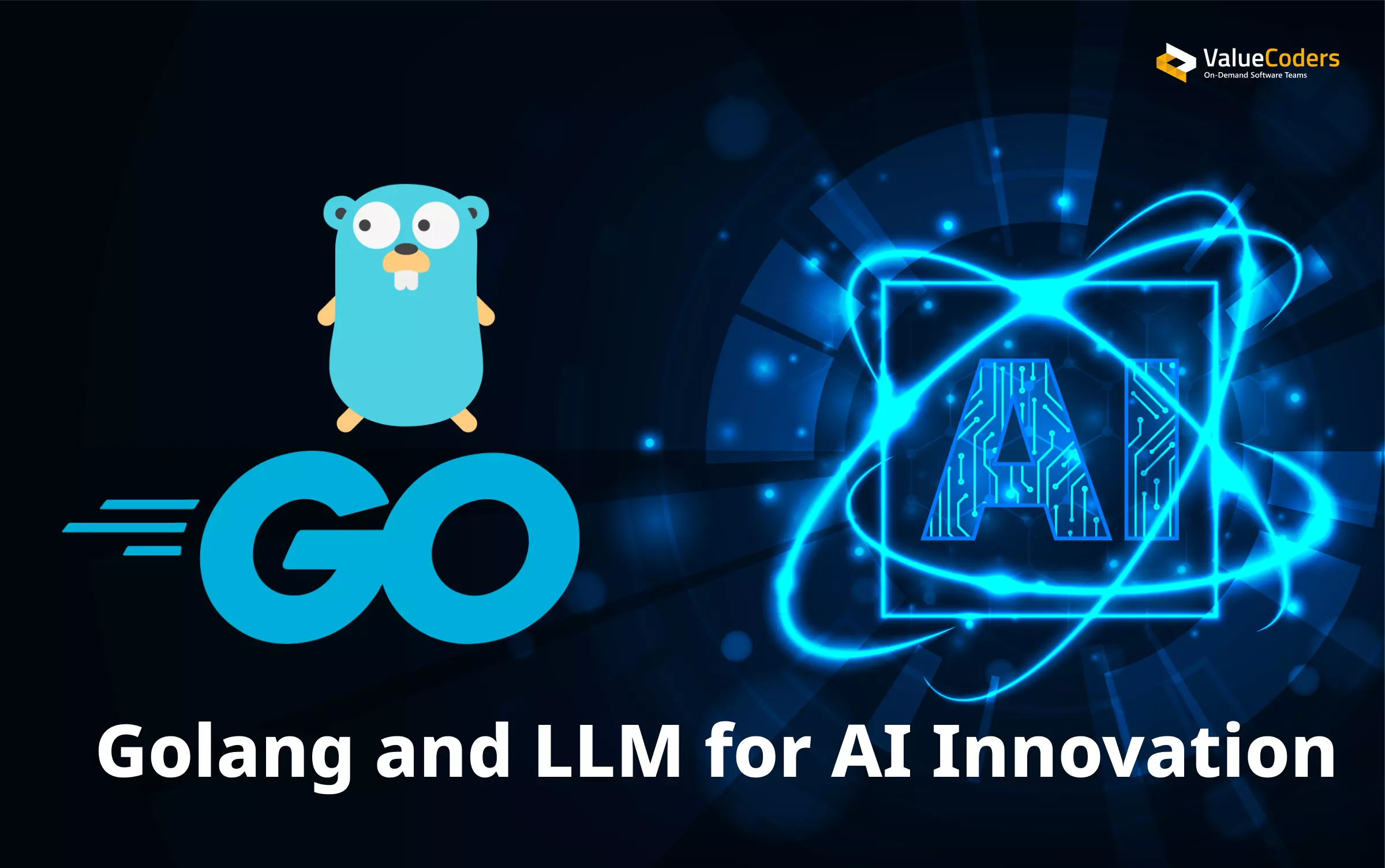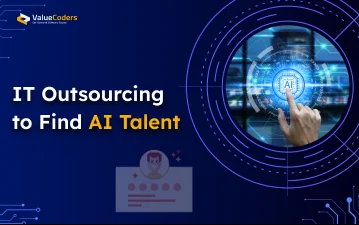After generative AI (which helps developers generate code and saves time), it’s time for a great revolution in software development. The AI agents era is here.
According to a 2025 report by Statista, the market value of Agentic AI stood at $5.1 billion in 2024, which is expected to surpass $47 billion by 2030 at a CAGR rate of over 44%
But what exactly are AI agents?
AI agents use advanced language models to make decisions, perform complex tasks, and interact autonomously on behalf of individuals/enterprises. They serve as an additional partner for software developers and act like LEGOs.
Let’s explore the critical role of AI agents in software development, its impact, benefits & challenges in implementing AI agents, and the future of AI agents in software development.
Let AI handle repetitive coding, testing, and debugging for faster project completion.
Role of AI Agents in Software Development
AI agents are systems designed to perform tasks independently and make decisions using real-time learning and feedback loops. They are experts in large datasets, identifying patterns, and executing tasks autonomously without requiring constant supervision.
Unlike traditional automation, which follows predefined rules, AI agents use advanced techniques like natural language processing and machine learning to adapt and improve over time. Its core characteristics include:
Natural language processing (NLP)
AI agents understand and generate human-like responses, enabling seamless interactions with developers.
Machine learning-driven recommendations
They learn from data to refine their operations and improve accuracy over time.
Autonomous decision-making
By analyzing input and historical trends, AI agents can independently handle tasks without waiting for human intervention.
Types of AI Agents in Software Development
Software development relies on different types of intelligent tools that assist in various tasks, from writing and reviewing code to automating testing and debugging. These tools are designed to streamline processes and enhance overall productivity.
1. Specialized Agents
These agents focus on specific tasks such as reviewing code, generating documentation, or running tests. For instance:
- Code review agents identify vulnerabilities or coding inconsistencies.
- Test automation agents ensure comprehensive quality checks.
2. Multi-Agent Architectures
A network of agents works together to tackle complex challenges. Each agent focuses on a specific task while sharing outputs to accomplish a larger goal.
AI agents automate CI/CD, minimizing human errors in software releases.
AI Agent Impact on the Software Development Life Cycle
Modern technology is reshaping how software is built, tested, and maintained. From planning to deployment, automated solutions make development cycles faster, more efficient, and less prone to errors.
Requirement Gathering & Analysis
AI agents help teams start projects right by:
- Looking through project data to spot important requirements others might miss
- Suggesting useful features based on successful similar projects
- Helping write clear, complete requirement documents
Design & Architecture
During the design phase, AI agents assist by:
- Creating quick prototypes to test ideas
- Suggesting design improvements based on proven patterns
- Making it easier for design and development teams to work together
Coding & Development
AI agents make coding more productive by
- Helping write common code patterns
- Catching errors as developers type
- Offering debugging help when problems occur
Testing & Quality Assurance
Quality improves with AI agents that:
- Run automated tests quickly and thoroughly
- Track bugs and predict where problems might occur
- Check if new code might cause problems before it’s added to the project
Deployment & Maintenance
AI agents keep the software running smoothly by:
- Automating the process of putting new code into production
- Watching for potential problems before they affect users
- Fixing common issues automatically
AI predicts slowdowns, optimizes workflows, and boosts efficiency. Get AI talent to make your SDLC seamless.
Benefits of Integrating AI Agents in Software Development
Integrating AI in software development helps reduce manual work, improve accuracy, and speed up project timelines. This allows teams to focus on innovation rather than repetitive tasks.
Less Manual Work
Automating repetitive tasks frees software developers to focus on creative problem-solving. AI agents help in:
- Generating and completing code
- Provide AI-driven testing frameworks
- Managing deployments and monitoring
Better Decision-Making
AI agents identify risks and suggest workflow improvements. Teams make better choices with AI agents that:
- Spot potential problems early
- Suggest ways to improve how work gets done
- Use data to back up recommendations
Enhanced Collaboration
Multi-agent systems work together to resolve complex tasks. AI agents help teams collaborate by:
- Keeping everyone updated on the project status
- Spotting when work is stuck and suggesting fixes
- Helping different teams coordinate their efforts
Taking Care of Developers
Tools monitor stress levels and help prevent burnout. AI agents help prevent burnout by:
- Noticing when team members might be overworked
- Suggesting breaks and task redistribution
- Keeping workloads manageable
Increased Efficiency
Automation allows teams to work faster with fewer errors. Teams work faster because AI agents:
- Handle routine tasks automatically
- Help top dedicated developers avoid common mistakes
- Keep projects moving smoothly
Better Software Quality
AI Agents assist with checking code quality using best practices. Code quality improves as AI agents:
- Check for common coding mistakes
- Make sure the code follows team standards
- Spot potential problems before they reach users
Faster Time-To-Market
Streamlined processes lead to quicker releases and agile responses to market changes. Projects finish sooner because:
- Many tasks happen automatically
- Teams catch problems earlier
- Work flows more smoothly between stages
AI-driven testing tools identify issues faster, cutting down manual effort and expenses.
Key Areas Transformed by AI Agents
Technology-driven automation is making a significant impact on various aspects of software development, including code generation, bug fixing, testing, and security. These advancements help developers work more efficiently.
Automated Code Reviews
Tools like GitHub and Copilot and IBM SWE-Agent provide immediate feedback on code quality, ensuring adherence to standards and reducing errors. These tools help by:
- Checking code against quality rules
- Finding potential bugs
- Suggesting better ways to write code
Predictive Analytics
AI agents forecast potential bottlenecks, enabling teams to address issues before they delay projects. AI agents help teams plan better by:
- Spotting where projects might get stuck
- Figuring out what resources teams will need
- Warning about potential future problems
Enhanced Security
Real-time identification of vulnerabilities ensures that critical issues are resolved early. Security improves with AI agents that:
- Find security problems quickly
- Fix common security issues automatically
- Keep teams informed about new security threats
DevOps Support
Automation in deployment processes ensures smoother transitions from development to production environments. Development runs better with AI agents handling:
- Automatic updates to production systems
- Coordination between development and operations
- Quick responses to system problems
Team Coordination
AI agents generate summaries for standup meetings, track project goals, and identify workflow disruptions. AI agents help teams stay organized by:
- Summarizing daily progress
- Finding workflow problems
- Suggesting better ways to divide work
Documentation Creation
Automated tools generate comprehensive technical documentation, reducing the time developers spend on non-coding tasks. Technical documentation stays current with AI agents that:
- Update docs automatically when code changes
- Make sure documentation is clear and complete
- Keep reference materials organized
Also Read: How AI Improves Software Development Efficiency and Innovation
Challenges in Adopting AI Agents in the SDLC
Adopting new technologies in software development comes with its own set of challenges. Teams often face issues like integration complexities, data security concerns, and the need for upskilling to adapt to evolving tools and workflows.
Let’s look at the top challenges faced while implementing AI agents in SDLC:
Building Trust
Teams need time to:
- Make sure AI agents work reliably
- Learn when to trust AI suggestions
- Find the right balance between human and AI work
Hence, AI agents must consistently deliver accurate results to gain acceptance among top AI engineers and management teams.
Keeping Data Secure
Companies must:
- Protect sensitive information when using AI
- Control what data AI agents can access
- Make sure AI usage follows security rules
With multiple agents accessing and sharing sensitive data, maintaining strict security protocols is essential.
Managing Costs
Organizations should plan for:
- Initial setup expenses
- Ongoing usage costs
- Training and support needs
Deploying AI agents can be expensive, particularly for large-scale or complex projects, requiring thoughtful budgeting.
Ethical Considerations
Teams must think about:
- Making sure AI decisions are fair
- Understanding how AI makes choices
- Setting clear rules for AI use
The decision-making capabilities of AI agents must be transparent, ensuring they align with organizational values and avoid biased outcomes.
Skill Gaps
Success requires:
- Training teams to work with AI tools
- Understanding AI capabilities and limits
- Creating new work processes
Software teams may need additional training to fully understand and utilize the capabilities of AI agents.
Integration Challenges
Companies need plans for:
- Adding AI to existing tools
- Updating old systems to work with AI
- Keeping everything working together
Existing legacy systems may not always align with AI-driven workflows, requiring significant adaptation or upgrades.
Also read: Best AI Development Companies To Get Innovative And Tech-Driven Solutions
Some Popular Examples of AI Agents
Some of the leading companies have introduced advanced tools that assist in different phases of software development. These tools help with everything from writing clean code to detecting vulnerabilities in applications.
1. Agentra
It helps in automating tasks, optimizing business decisions, and delivering exceptional customer experiences by reducing operational costs by 40%.
2. IBM SWE Agents
IBM has developed AI agents to automate software engineering tasks. SWE agents can localize and fix problems in 5 minutes with a success rate of 23.7%
3. Devin
It is a collaborative AI teammate that responds to natural language requests in real time, learns from feedback, and shares its plans.
4. GitHub Copilot Agents
Copilot agents can perform various tasks, such as retrieving data, performing specific actions, and providing AI-assisted coding suggestions.
5. OpenAI CUA
It is a model that combines GPT-4o’s vision capabilities with advanced reasoning through reinforcement learning. It is trained to interact with graphical user interfaces.
Furthermore, OpenAI and Google are both working on developing their own AI agents.
Also Read: AI-Powered Future: Revolutionizing Businesses with Tools Like ChatGPT
Future of AI Agents in Software Development
The software development industry is continuously evolving, with AI agents becoming an essential part of development workflows. As this technology advances, it is expected to play an even greater role in shaping the future of AI software engineering.
Let’s explore what lies ahead for AI agents in this field:
Rise in Multi-Agent Systems
Instead of a single AI agent handling every task in software development, there will be specialized agents working on different aspects of development. This multi-agent approach would help reduce development timelines and improve efficiency.
Great Focus on Real-Time Collaboration
AI agents will become more customizable, adapting to the core needs of different projects and teams. Moreover, the real-time collaboration between AI and developers will become more intuitive.
Increased Adoption Across all SDLC Stages
There will be widespread adoption of AI agents in the future, which will be felt across all the stages of SDLC. It will pave the way for more efficient workflows and allow developers to focus on complex tasks while handling repetitive tasks on their own.
Integration of Low-Code/No-Code Platforms
This will be a great trend as these platforms empower non-technical users to develop applications via intuitive visual interfaces. Due to this, more and more people can participate in building digital solutions.
Advancement in Foundation Models
As foundation models continue to grow in sophistication, AI agents will become better at understanding project requirements, writing optimized code, and even suggesting architectural improvements.
Also Read: Navigating the World of AI Development: Opportunities & Challenges
Conclusion
AI agents handle routine tasks, catch problems early, and help teams work better together.
While there are challenges to adding AI agents to development teams, the benefits make it worthwhile. Companies that start using AI agents now will be better prepared for the future of software development.
If you want to build better software more quickly, connect with ValueCoders. We have been a leading AI development company since 2004, delivering innovative solutions across 30+ industries. Contact us today!


